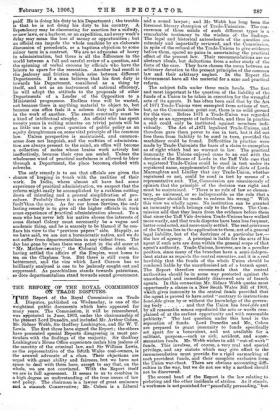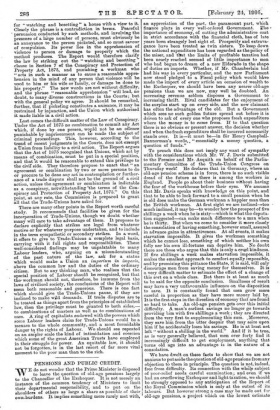THE REPORT OP THE ROYAL COMMISSION Ot - TRADE DISPUTES.
Troll Report of the Royal Commission on Trade Disputes, published on Wednesday, is one of the weightiest public documents ;which have appeared for many years. The Commission, it will be remembered, was appointed in June, 1903, under the chairmanship of the piessent Lord Dunedin, and included Mr. Arthur Cohen, Mr. Sidney Webb, Sir Godfrey Lushington, and Sir W. T. Lewis. The farst three have signed the Report; the others have presented special Reports disagreeing in most par- ticulars with the findings of the majority. Sir Godfrey Lushington's Home Office experience makes him jealous of the sanctity of the criminal law, and Sir William Lewis, as the representative of the Seruth Wales coal-owners, is the avowed advocate of a class. Their objections are urged with .great ability and fairness, but we have not space to deal with them here, except to say that, on the whole, we are not convinced. With the Report itself we are in full agreement. It seems to us to combine in a high .degree an understanding of the true issues of law and policy. The chairman is a lawyer of great eminence and a staunch Conservative ; Mr. Cohen is a Liberal and a sound lawyer ; and Mr. Webb has long been the foremost literary champion of Trade-Unionism. The con- currence of three minds of such different types is a, remarkable testimony to the wisdom of. the findings. The legal and historical antecedents of the question are minutely and impartially reviewed, and the Commission, in spite of the refusal of the Trade-Unions to give evidence before them, spared no pains in ascertaining the practical effect of the present law. Their recommendations are no abstract ideals, but deductions from a sober study of the facts of the case. They have chosen the mean between an arbitrary devotion to the present principles of the coMmon law and their arbitrary neglect. In the Report the Government have all the material for a sane and practical reform.
The subject falls under three main heads. The first and most important is the question of the liability of the funds of a Union to be taken in execution for the wrongful acts of its agents. It has Often been said that by the Act of 1871 Trade-Unions were exempted from actions of tort, but, as the Commission point out, there is no solid ground. for this view. Before 1871 a Trade-Union was regarded simply as an aggregate of individuals, and thus in practice a suit could only be instituted against members indi- vidually. The Act of .1871 legalised Trade-Unions, and therefore gave them power to sue in tort, but it did not free them from liability to be sued in turn, provided the machifiery could be found. Difficulties in practice were made by Trade-Unionists the basis of a claim to exemption as of right which had no warrant in law. The practical immunity. the Unions enjoyed came to an end with the decision of the House of Lords in the Taff Vale cam that a registered Trade-Union could be sued in tort under its registered name, supplemented. by the obiter dicta of Lords Macnaghten and Lindley that any Trade-Union, whether registered or not could be sued in tort by means of a representative suit. The, Commission are unanimously of opinioh that the principle of the decision was right and must be maintained. "There is no rule of law so elemen- tary, so universal, or so indispensable as the rule • that a wrongdoer should be made to redress his wrong." With this view we wholly agree. No institution can be granted an immunity which belongs only to the Crown. The Com- mission add that they learn from the evidence before them that since the Taff Vale decision Trade-Unions have walked more warily, and that trade disputes have been less frequent, better conducted, and more easily settled. The real grievance of the 'Unions lies in the application to them, not of a general legal liability, but of the doctrines of a particular law,— the law of agency. A principal is liable for the acts of his agent if such acts are done within the general scope of that agent's authority. Trade-Unions, however, are in a peculiar position, since many of the branches have a semi-indepen- dent status as regards the central executive, and it is a real hardship that the funds of the whole Union should be rendered. liable by the unauthorised act of a branch agent. The Report therefore recommends that the central authoritiea should be in some way protected against the unauthorised and immediately disavowed acts of branch agents. In this connection Mr. Sidney Webb quotes most opportunely a clause in a New South Wales Bill of 1903, which gives immunity to the central funds provided that the agent is proved to have acted "contrary to instructions bond-fide given by or without the knowledge of the govern- ing body and that the Union has bend-fide and by all reasonable means repudiated the acts or words com- plained of at the earliest opportunity and with reasonable publicity." The last question under this head is the separation of funds. Lord Dunedin and Mr.„ Cohen are prepared to grant immunity to funds specifically set apart for a benevolent, and not available for a., militant, purpose,—such as sick, accident, and super- animation funds. Mr. Webb wishes to add " out-of-work " funds. This involves, of course, a very real and special privilege, and any statute which may give effect to the recommendation must provide for a rigid earmarking of such provident funds, and their complete exclusion from the Union war-chest. There are obvious accounting diffi- culties in the way, but we do not see why a method should not be discovered.
The second head of the Report is the law relating to picketing and the other incidents of strikes. As it stands, a workman is not punished for" peacefully persuading," but for "watching and besetting" a house with a view to it. Clearly the phrase is a contradiction in terms. Peaceful • persuasion conducted by such methods, and. involving the presence of a large number of persona, must obviously be an annoyance to the person picketed, and so must savour of compulsion. Its power lies in the apprehension of violence to person or damage to property which the method produces. The Report would therefore clarify the law by striking out the "watching and besetting" clause in Section 7 of the Conspiracy and Protection of Property Act, 1875, and punishing a workman who "acts in such a manner as to cause a reasonable appre- hension in the mind of any person that violence will be used to him or his wife or family, or damage be done to his property." The new words are not without difficulty, and the phrase "reasonable apprehension" will lead, no doubt, to many diverse constructions in the Courts ; but with the general policy we agree. It should be remarked, further, that if picketing constitutes a nuisance, it may be restrained by injunction, and the Union which authorised it made liable in a civil action.
Last comes the difficult matter of the Law of Conspiracy. Under the Act of 1875 no combination to commit any Act which, if done by one person, wopld not be an offence punishable by imprisonment can be made the subject of criminal proceedings. This, however, according to the trend of recent judgments in the Courts, does not exempt a Union from liability to a civil action. The Report argues that the Act of 1875 recognised that Unions, which act by means of combination, must be put in a special position, and that It would be reasonable to extend this privilege to the civif side. They therefore propose . to enact that "an agreement or combination by two or more persons to do or procure to be done any act in contemplation or further- auce of a trade dispute shall not be the ground of a civil action, unless the agreement or combination is indictable as a conspiracy, notwithstanding 'the terms of the Con- spiracy and Protection of Property Act, 1875." On this point, at any rate, the Commission is prepared to grant all that the Trade-Unions have asked for.
There are many other points in the Report worth careful study. It recommends that facilities be given for the incorporation of Trade-Unions, though we doubt whether many will care to take advantage of them. It proposes to declare explicitly that strikes are legal from whatever motive or for whatever purpose undertaken, and to include in the term sympathetic or secondary strikes. In a word, it offers to give to Trade-Unions a complete legal basis, carrying with it full rights and: responsibilities. These well-considered findings may be unpalatable to many Labour leaders, who, arguing on a misunderstanding of the past nature of the law, ask for a status which would make a Union an imperium in imperio, above the common law and the duties of the ordinary citizen. But to any thinking man, who realises that the special position of Labour should be recognised, but that the. workman should not, therefore, be immune from the laws of civilised society, the conclusions of the Report will Seem both reasonable and generous. There is one fact which should give the Trade-Unions pause, if they are inclined to make wild. demands. If trade disputes are te be treated as things apart from the principles of established law, then the privilege must be granted to both sides,— to combinations of masters as well as to combinations of men. A ring of capitalists .endowed with the powers which Wile Labour leaders claim for Trade-Unions would be a menace to the whole community, and a most formidable danger to, the rights of Labour. We should see repeated. on an ampler scale the kind of intimidation and coercion which some of the great American Trusts have employed in their struggle for power. An equitable law, it should not be forgotten, is in the last resort of far more vital moment to the poor man than to the rich.











































 Previous page
Previous page